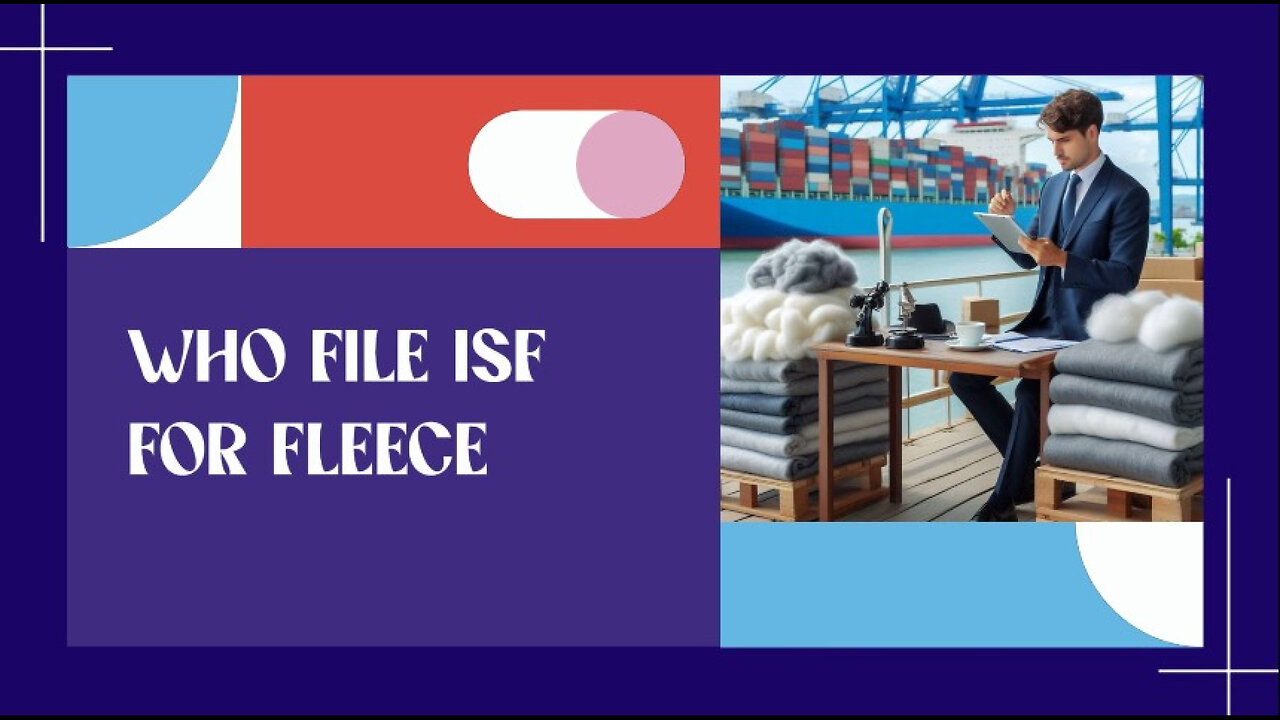Premium Only Content

Unlocking ISF Secrets: Mastering Fleece Imports for Smooth Customs Clearance!
US Customs Clearing | 213-270-1930 | [email protected] | https://uscustomsclearing.com/
This response delves into the intricacies of Importer Security Filing (ISF) in the context of fleece imports, emphasizing its significance in customs brokerage. It explores the essential elements of ISF, responsibilities of importers and customs brokers, consequences of non-compliance, and best practices for efficient filing. The prompt mentions the importance of accurate data submission, timely filing, and the role of technology in streamlining ISF processes. Additionally, the discourse touches upon the linkage between customs bonds and ISF for ensuring seamless customs clearance of fleece imports.
Customs brokerage professionals play a vital role in navigating the complexities of ISF filings, especially concerning specific imports like fleece materials. Understanding the 10+2 rule and the data elements required for ISF submissions is crucial in enhancing security measures and evaluating potential risks. Proper classification of fleece products under harmonized tariff codes is essential for determining duties and ensuring compliance during the customs clearance process.
The responsibility of filing ISF lies primarily with the importer of record; however, customs brokers often assist in this process due to their expertise in dealing with intricate regulations. Compliance with ISF regulations is imperative to avoid penalties and maintain the efficiency of supply chain operations. Leveraging technology for automated ISF systems can help minimize errors and streamline the filing process, particularly beneficial for intricate classifications like fleece.
Moreover, the correlation between customs bonds and ISF is fundamental in guaranteeing the timely payment of duties, taxes, and penalties, thereby facilitating smooth customs clearance for fleece imports. Adhering to best practices such as collaborating with reliable customs brokers, ensuring accurate data collection, and conducting regular compliance audits can significantly improve ISF performance. Overall, a comprehensive understanding of ISF requirements is indispensable for successful customs brokerage operations involving fleece imports.
#usimportbond #isfcustomsbroker #uscustomsclearing #isfentry
Video Disclaimer Here: For learning purposes only, We claim no affiliation with any US government agency.
00:08 - The Importer Security Filing (ISF) is essential for international trade, requiring importers to submit specific data to U.S. Customs and Border Protection (CBP) 24 hours before goods arrive, following the 10+2 rule which includes ten data points from the importer and two from the shipping line.
1:12 - The importer of record is primarily responsible for filing the ISF, often utilizing customs brokers for their expertise. Accurate data points—such as importer identity, consignee details, manufacturer name, product descriptions, and country of origin—are crucial, especially for fleece imports to ensure compliance and avoid delays.
2:14 - Failing to file ISFs correctly and on time can result in penalties up to $5,000 per violation. Compliance is vital for protecting financial interests and maintaining efficient supply chain operations when importing fleece.
2:31 - Importers should adopt best practices, such as building strong relationships with customs brokers, ensuring timely data collection, and conducting regular audits. Leveraging automated systems can enhance the ISF filing process, reduce human error, and facilitate smoother customs clearance with the help of customs bonds.
-
 1:50:43
1:50:43
Tucker Carlson
44 minutes agoChris Williamson’s Advice to Men: How to Survive a World of OnlyFans and AI Girlfriends
5.33K11 -
 1:07:25
1:07:25
Timcast
1 hour agoBomb DETONATED At Harvard, Attacks On Ice Agents SKYROCKET
123K77 -
 1:55:31
1:55:31
Steven Crowder
4 hours agoTucker Carlson & MAGA: Everyone is Missing the Point
316K232 -
 1:11:22
1:11:22
The Rubin Report
3 hours agoWatch Joe Rogan’s Face as Elon Musk Exposes How Dems Are Cheating in Plain Sight
46.6K58 -
 1:01:07
1:01:07
VINCE
4 hours agoThe Walls Are Closing In On The Deep State | Episode 160 - 11/03/25
218K137 -
 LIVE
LIVE
LFA TV
19 hours agoLIVE & BREAKING NEWS! | MONDAY 11/3/25
2,746 watching -
 1:31:18
1:31:18
Graham Allen
5 hours agoErika Fights Back: Vows To EXPOSE TRUTH & DEMANDS Trial Goes Public!! Left Says Her Grief Is FAKE!
146K81 -
 2:08:47
2:08:47
Badlands Media
9 hours agoBadlands Daily: November 3, 2025 – Tariff Wars, SNAP Panic & Brennan Gets Confronted
66.8K16 -
 2:59:32
2:59:32
Wendy Bell Radio
8 hours agoThings Will Get Worse Before They Get Better
92.4K112 -
 1:18:28
1:18:28
The Big Mig™
5 hours agoICE Will Use Private Bounty Hunters, LFG
37.6K13